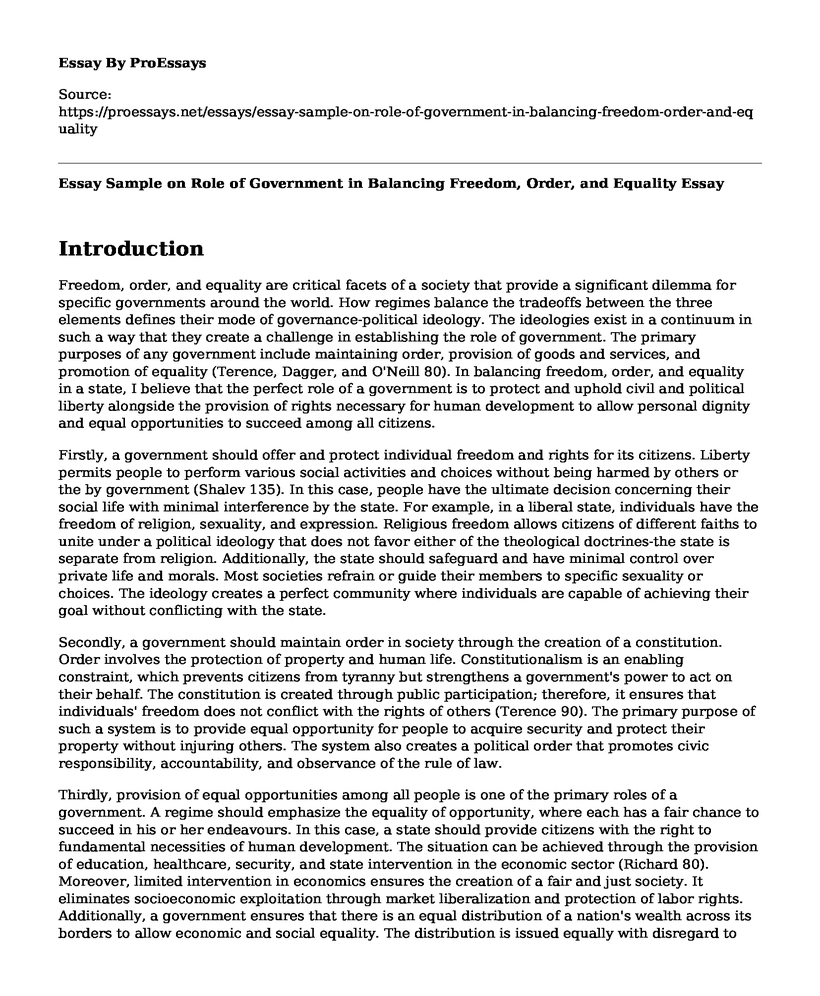Introduction
Freedom, order, and equality are critical facets of a society that provide a significant dilemma for specific governments around the world. How regimes balance the tradeoffs between the three elements defines their mode of governance-political ideology. The ideologies exist in a continuum in such a way that they create a challenge in establishing the role of government. The primary purposes of any government include maintaining order, provision of goods and services, and promotion of equality (Terence, Dagger, and O'Neill 80). In balancing freedom, order, and equality in a state, I believe that the perfect role of a government is to protect and uphold civil and political liberty alongside the provision of rights necessary for human development to allow personal dignity and equal opportunities to succeed among all citizens.
Firstly, a government should offer and protect individual freedom and rights for its citizens. Liberty permits people to perform various social activities and choices without being harmed by others or the by government (Shalev 135). In this case, people have the ultimate decision concerning their social life with minimal interference by the state. For example, in a liberal state, individuals have the freedom of religion, sexuality, and expression. Religious freedom allows citizens of different faiths to unite under a political ideology that does not favor either of the theological doctrines-the state is separate from religion. Additionally, the state should safeguard and have minimal control over private life and morals. Most societies refrain or guide their members to specific sexuality or choices. The ideology creates a perfect community where individuals are capable of achieving their goal without conflicting with the state.
Secondly, a government should maintain order in society through the creation of a constitution. Order involves the protection of property and human life. Constitutionalism is an enabling constraint, which prevents citizens from tyranny but strengthens a government's power to act on their behalf. The constitution is created through public participation; therefore, it ensures that individuals' freedom does not conflict with the rights of others (Terence 90). The primary purpose of such a system is to provide equal opportunity for people to acquire security and protect their property without injuring others. The system also creates a political order that promotes civic responsibility, accountability, and observance of the rule of law.
Thirdly, provision of equal opportunities among all people is one of the primary roles of a government. A regime should emphasize the equality of opportunity, where each has a fair chance to succeed in his or her endeavours. In this case, a state should provide citizens with the right to fundamental necessities of human development. The situation can be achieved through the provision of education, healthcare, security, and state intervention in the economic sector (Richard 80). Moreover, limited intervention in economics ensures the creation of a fair and just society. It eliminates socioeconomic exploitation through market liberalization and protection of labor rights. Additionally, a government ensures that there is an equal distribution of a nation's wealth across its borders to allow economic and social equality. The distribution is issued equally with disregard to race, color, gender, sexuality, nationality, or religion by the constitution.
Conclusion
Overall, freedom, order, and equality exist in a continuum; therefore, each cannot be realized at its extreme. A nation balances the above elements to create fundamental political and socioeconomic ideologies to govern its people. I believe that a government should focus on strengthening social freedom and equality to permit a state to achieve all-round prosperity. A Liberalism ensures that a state upholds civic freedom and provides equal chances of success for all its citizens, which is ideal in governing a country in the twenty-first century.
Works Cited
Ball, Terence, Richard Dagger, and Daniel I. O'Neill. "Liberalism." Political Ideologies and the Democratic Ideal. Routledge, 2016. 70-129.
Richard, J. Arneson. "Equality and equal opportunity for welfare." Theories of Justice. Routledge, 2017. 75-91.
Shalev, Michael. "Liberalization and the Transformation of the Political Economy." The New Israel. Routledge, 2018. 129-159.
Cite this page
Essay Sample on Role of Government in Balancing Freedom, Order, and Equality. (2022, Nov 11). Retrieved from https://proessays.net/essays/essay-sample-on-role-of-government-in-balancing-freedom-order-and-equality
If you are the original author of this essay and no longer wish to have it published on the ProEssays website, please click below to request its removal:
- Constitutional Amendments
- History of US Law Enforcement Essay
- The War Room Essay Example
- Effects of Government Involvement on Creativity and Innovation - Essay Sample
- When Welfare Policy Fails: Paper Example on Real Issue to Better Serve Children
- Research Paper on Inclusive Development: Key Indicators & Reasons for Promotion
- Free Essay Example on Law & Sovereignty: Native American Tribes & U.S. Government







